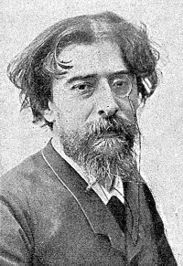أنت هنا لأنك تحب القراءة 📚. ونحن هنا لنضمن أن تبقى آلاف الكتب بين يديك، مجانًا. لكن الحقيقة هي أن "كتوباتي" مشروع له تكاليف تشغيلية من استضافة وسيرفرات إلى تطوير وصيانة. ونحن نعتمد على دعم مجتمع القرّاء أنفسهم 🙏. دعمك المباشر، حتى ولو بثمن كتاب واحد، هو ما يسمح لهذه المعادلة بالاستمرار: مكتبة مجانية للجميع، برعاية قرائها .
In the Land of Pain by Alphonse Daudet As Julian Barnes writes in the introduction to his superb translation of Alphonse Daudet’s La Doulou, the mostly forgotten writer nowadays “ate at the top literary table” during his lifetime (1840–1897). Henry James described him as “the happiest novelist” and “the most charming story-teller” of his day. Yet if Daudet dined in the highest company, he was also “a member of a less enviable nineteenth-century French club: that of literary syphilitics.” In the Land of Pain—notes toward a book never written—is his timelessly resonant response to the disease. In quick, sharp, unflinching strokes of his pen, Daudet wrote about his symptoms (“This is me: the one-man-band of pain”) and his treatments (“Mor-phine nights . . . thick black waves, sleepless on the surface of life, the void beneath”); about his fears and reflections (“Pain, you must be everything for me. Let me find in you all those foreign lands you will not let me visit. Be my philosophy, be my science”); his impressions of the patients, himself included, and their strange life at curative baths and spas (“Russians, both men and women, go into the baths naked . . . Alarm among the Southerners”); and about the “clever way in which death cuts us down, but makes it look like just a thinning-out.”Given Barnes’s crystalline translation, these notes comprise a record—at once shattering and lighthearted, haunting and beguiling—of both the banal and the transformative experience of physical suffering, and a testament to the complex resiliency of the human spirit.
In the Land of Pain by Alphonse Daudet As Julian Barnes writes in the introduction to his superb translation of Alphonse Daudet’s La Doulou, the mostly forgotten writer nowadays “ate at the top literary table” during his lifetime (1840–1897). Henry James described him as “the happiest novelist” and “the most charming story-teller” of his day. Yet if Daudet dined in the highest company, he was also “a member of a less enviable nineteenth-century French club: that of literary syphilitics.” In the Land of Pain—notes toward a book never written—is his timelessly resonant response to the disease. In quick, sharp, unflinching strokes of his pen, Daudet wrote about his symptoms (“This is me: the one-man-band of pain”) and his treatments (“Mor-phine nights . . . thick black waves, sleepless on the surface of life, the void beneath”); about his fears and reflections (“Pain, you must be everything for me. Let me find in you all those foreign lands you will not let me visit. Be my philosophy, be my science”); his impressions of the patients, himself included, and their strange life at curative baths and spas (“Russians, both men and women, go into the baths naked . . . Alarm among the Southerners”); and about the “clever way in which death cuts us down, but makes it look like just a thinning-out.”Given Barnes’s crystalline translation, these notes comprise a record—at once shattering and lighthearted, haunting and beguiling—of both the banal and the transformative experience of physical suffering, and a testament to the complex resiliency of the human spirit.
المزيد...

